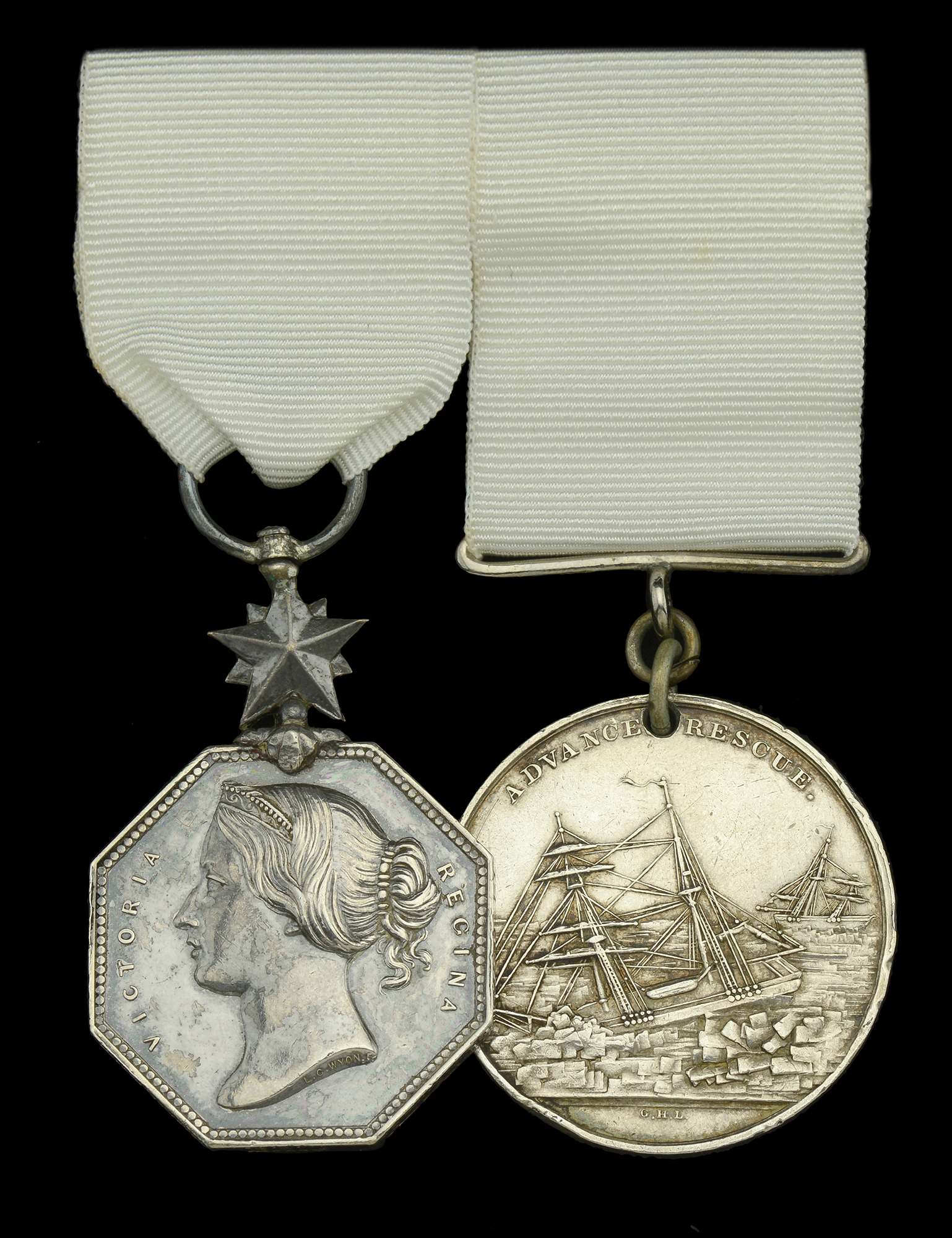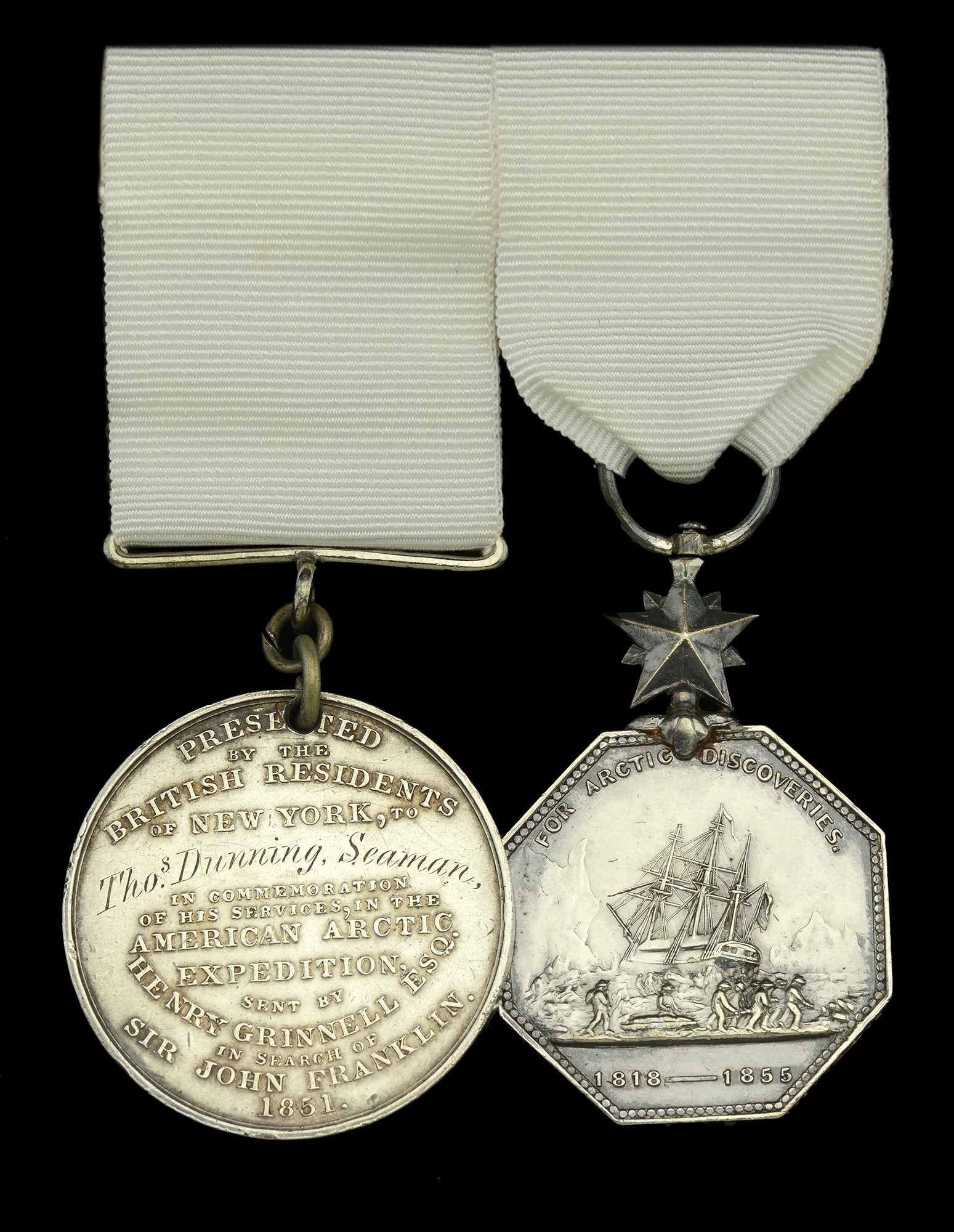The rare First Grinnell Arctic Expedition Pair awarded to Thomas Dunning, Seaman, United States Navy, for services in the American brig Advance Arctic Medal 1818-55 (Thomas Dunning, American Brig Advance 1850-51) naming engraved in capitals; American Arctic Expedition Medal 1851, obverse: two sailing ships stuck fast in ice, ‘Advance [&] Rescue’; reverse, inscription in raised lettering, name engraved in running script ‘Presented by the British Residents of New York, to Thos. Dunning, Seaman, in commemoration of his services , in the American Arctic Expedition, sent by Henry Grinnell Esq. in search of Sir John Franklin. 1851’, 38mm, silver, pierced with double ring and bar suspension, some edge bruising and contact marks but generally very fine (2) £8,000-£10,000 --- Importation Duty This lot is subject to importation duty of 5% on the hammer price unless exported outside the UK --- --- Provenance: Sotheby’s, March 1982; Morton & Eden, October 2003. Note: Although both medals show the spelling Dunning, contemporary United States documents refer to the recipient as Dunnin. The ill-fated Franklin expedition set out in the Erebus and Terror to find a North West Passage west from Lancaster Sound on 19 May 1845. From 25 July they were in the company of two whalers in Melville Bay, awaiting an opportunity to get through the ice into Lancaster Sound. This was the last time that the ships were seen by any European; by the Spring of 1848, all 129 men had perished. During the next 30 years over forty search expeditions by sea and land went out to search for signs of Franklin and his men. Rewards of £10,000 from the Admiralty and £3,000 from Lady Franklin were offered for precise information. Lady Franklin appealed to President Zachary Taylor early in 1850, urging him to launch another attempt, but while the President was favourably inclined towards the proposal Congress was not prepared to finance it. Subsequently Mr Henry Grinnell, a wealthy New York merchant, offered to fund an expedition, with Congress authorising a detail of officers and men from the Navy to man it. Two small brigs, renamed Advance and Rescue were obtained, of 144 and 64 tons respectively; they were fitted out generously with the best equipment available at that time. Conditions on board were severely cramped but their seaworthiness was excellent and their smallness protected them against ice pressure, which was later to prove their salvation. The commander of the expedition was Lieutenant Edwin J. De Haven. Aged 34, he had served in Wilkes’ Antarctic expedition and was considered to be an authority on meteorology and oceanography. Dr. Elisha Kane accompanied the Advance and subsequently won distinction as an Arctic explorer in two expeditions which he led. The Advance was manned by seventeen men, Rescue by sixteen. On a cheerless day in May 1850, the ships cast off from the navy yard and were towed down the East River by the small steamer Nachant, heartily cheered by the spectators on the wharves and battery. Mr Grinnell and his two sons accompanied De Haven in the Advance well outside the Hook, and returned to New York in the Pilot boat. De Haven’s instructions were to search Lancaster Sound and Barrow Strait as far west as Cape Walker, and to the northward in the Wellington Channel. The ships were to keep in company if possible and to avoid spending the winter in the Arctic unless it became necessary, but under no circumstances was he to remain longer than two years. On 19 August the American ships entered Lancaster Sound and encountered two British vessels, the Lady Franklin and Sophia, part of a search party funded by Lady Franklin. Eight days later they discovered Franklin’s winter quarters for 1846, and the graves of three men who had died on board ship were discovered by Captain Penny of the Lady Franklin. However, the weather was now worsening and by 14 September De Haven decided to return to the United States. After slow progress and rapidly deteriorating weather the vessels became locked fast in the ice of the Wellington Channel, and it became clear that the crew would have to spend the winter in the Arctic. Preparations were made to abandon ship, and officers and men were exercised in dragging loaded sleds on the ice. Soon scurvy appeared in the men and it was necessary to exercise all hands as much as possible. Football, skating, sledding and racing were daily occupations. Theatrical entertainments were devised and national holidays were observed with as much gaiety as could be devised. Christmas day was celebrated by a performance of The Comedy of the Blue Devils, with most of the comedy supplied by the heroine, a burly fellow of about six feet tall whose only qualification for the part was the absence of a beard. In the last week of April the crew returned to the ships, which were restocked and repaired ready for open water. On 29 May they passed out of the Arctic Circle but it was not until 5 June that the ships finally escaped the ice and floated free once more. On 17 June the Advance arrived at Whale Fish Island, Rescue coming in the following day. After five days rest De Haven decided to return to Barrow Strait and renew the search. On 7 July he fell in with two English whalers from whom he obtained fresh provisions and newspapers and, discouragingly, news of deteriorating ice conditions. De Haven still continued northward, until on 18 August the ice blocked him. He decided to abandon his efforts and return southwards. The Advance arrived in New York on 30 September, the Rescue a week later. The Grinnell medal, with a sum of money, was presented to every officer and man who had served on the Advance and Rescue. The presentation took place of Thursday 13 November 1851, on board the U.S.S. North Carolina.









